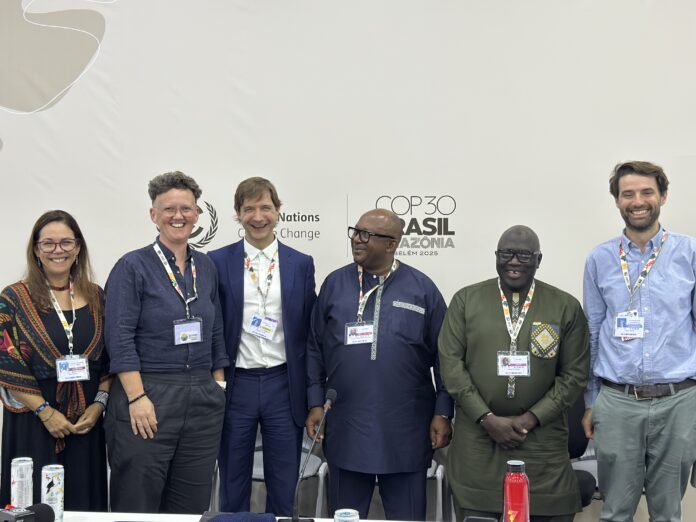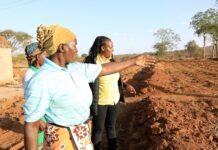Zimbabwe’s Permanent Secretary for the Environment Minister announces roadmap at COP30 in Belém
At an official side event hosted by World Federation for Animals (WFA) on Friday 14 November at COP30 in Belém, Brazil, Ambassador Tadeous T Chifamba, speaking on behalf of the Republic of Zimbabwe’s Minister of Environment, Climate & Wildlife, Dr Evelyn Ndlovu, announced that African leaders have agreed to pave the way for a Global Wildlife for Climate Action Declaration to be launched at COP31 next year. He was joined by Ambassador Lamin B Dibba, Ambassador and Permanent Representative to the United Nations, who represented Rohey John Manjang, Minister of Environment, Climate Change and Natural Resources in the Government of The Gambia at the event.
The endorsement was agreed at the inaugural African Union Biodiversity summit, held in Botswana in early November, where Heads of State adopted the ‘African Leaders Gaborone Declaration on Biodiversity’. In paragraph 44, leaders committed: ‘to endorse the Wildlife for Climate Action Agenda and Declaration and call upon the rest of the world to support Africa and Africa’s wildlife resources on this cause.’
This decision reflects growing recognition that protecting wildlife and restoring habitats is a cost-effective and nature-based solution to climate change, directly supporting the Paris Agreement.
Wild animals contribute significantly to natural carbon sequestration and ecosystem resilience by maintaining land and ocean ecosystems. Across Africa, elephants, antelopes, and other large herbivores disperse seeds, regenerate forests, and maintain grasslands that lock carbon in soils, helping to mitigate climate change. In rivers, mangroves and coastal wetlands, fish and marine species sustain blue-carbon ecosystems that buffer our coasts against storms and store carbon on a vast scale. Even creatures as small as termites play a role, burrowing to create their huge mounds, bringing up nutrients and water, allowing tree species to establish and create rich, resilient habitat mosaics.
However, wildlife is under threat from myriad forces, including habitat loss, poaching, and the illegal wildlife trade, meaning collective action is needed before it is too late. Recent analysis found that Africa is experiencing a continent-wide collapse in the animal ‘power’ that drives nutrient cycling, seed dispersal and other life-supporting functions, risking not just biodiversity but the livelihoods of those who depend on it.
Ambassador Chifamba made the announcement at an official side event hosted by the World Federation for Animals at COP30, “From synergies to action: Animals as the missing link”, which explored practical policy actions to advance climate, biodiversity and land restoration goals. He joined Tristan Tyrrell, Programme Management Officer, CBD Secretariat; Dra Ana Cristina Mendes de Oliveira, Professor, Federal University of Pará, Brazil; Tricia Croasdell, CEO, World Animal Protection; Dr James Yeates, CEO, World Federation for Animals.
Ambassador Chifamba said: “We know that healthy wildlife populations are engines of climate stability, yet until now there has been minimal collective commitment across the continent to protect them. With this new Declaration, African leaders have taken a huge step forward in recognising wildlife as allies in climate action. We invite the world to support us as we look ahead to launch at COP31, a key opportunity to secure global recognition of wildlife as an integral component of climate policy. Protecting wildlife is not just a moral imperative, but a cornerstone of our collective climate strategy; when wildlife thrives, ecosystems flourish and resilience grows.”
Ambassador Dibba added, “In The Gambia, we are witnessing firsthand how climate change is affecting our wildlife and the ecosystems on which they depend. Rising temperatures, altered rainfall patterns, and more frequent extreme weather events are impacting and changing habitats faster than many species can adapt. The socio-economic impact is significant. Wildlife-based tourism contributes to livelihoods, supports local enterprises, and showcases our natural heritage to the world. When biodiversity declines, we lose far more than species – we lose our economic resilience and sense of identity. For countries like The Gambia, enhancing cooperation between the Rio Conventions is not an abstract aspiration; it is a practical necessity. Protecting animals and transforming food systems must be central pillars of that effort.”
Dr James Yeates, CEO, World Federation for Animals, adds, “This announcement is a huge win for animals. While at COP30 decisions are being made at the highest levels to address climate change, wild animals across Africa – and the world – are quietly doing their bit, supporting ecosystems and contributing to carbon storage through their natural behaviours. I commend these Ministers for their forward-thinking approach, understanding that without a shared commitment, the fate of these wild animals will be under threat. I urge the world to get behind Africa ahead of the Declaration launch at COP31, acknowledging that protecting these animals is not just the compassionate thing to do, but is critical for the future of our planet.”
The forthcoming Wildlife for Climate Declaration builds on commitments made at the 20th African Ministerial Conference on the Environment (AMCEN) in Nairobi, and aligns with the African Union’s Agenda 2063: The Africa We Want, which recognises that Africa’s unique natural endowments, including its wildlife and wild lands, must be valued and protected to ensure climate resilience, biodiversity conservation, and sustainable development.









[…] Source link […]
Comments are closed.